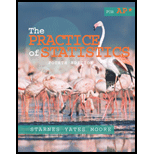
Concept explainers
To check: Whether there is sufficient evidence to conclude that phenotypes is occurring in ratio of 9:3:3:1.
Answer to Problem 18E
Yes, there is sufficient evidence to conclude that phenotypes are occurring in ratio of 9:3:3:1.
Explanation of Solution
Given:
Table is:
| Phenotype | Frequency |
| Tall cut | 926 |
| Tall potato | 288 |
| Dwarf cut | 293 |
| Dwarf potato | 104 |
Ratio is 9:3:3:1.
Formula used:
The formula to compute the test statistic is
Calculation:
The proportions are:
The null and alternative hypotheses are:
The calculation for test statistic is done as:
| Observed value | Expected value | |||
| 926 | 906.1875 | 19.8125 | 392.5352 | 0.4332 |
| 288 | 302.0625 | 14.0625 | 197.7539 | 0.6547 |
| 293 | 302.0625 | -9.0625 | 82.1289 | 0.2719 |
| 104 | 100.6875 | 3.3125 | 10.9727 | 0.109 |
The test statistic is:
The degree of freedom is calculated as:
The p-value using chi-square table at 1 degree of freedom is 0.6895
The p -value is above significance level. The null hypothesis does not get rejected. Thus, there is sufficient evidence to conclude that phenotypes are occurring in ratio of 9:3:3:1.
Chapter 11 Solutions
The Practice of Statistics for AP - 4th Edition
Additional Math Textbook Solutions
STATS:DATA+MODELS-W/DVD
Introductory Statistics
Introductory Statistics (2nd Edition)
Essentials of Statistics (6th Edition)
Statistical Reasoning for Everyday Life (5th Edition)
 MATLAB: An Introduction with ApplicationsStatisticsISBN:9781119256830Author:Amos GilatPublisher:John Wiley & Sons Inc
MATLAB: An Introduction with ApplicationsStatisticsISBN:9781119256830Author:Amos GilatPublisher:John Wiley & Sons Inc Probability and Statistics for Engineering and th...StatisticsISBN:9781305251809Author:Jay L. DevorePublisher:Cengage Learning
Probability and Statistics for Engineering and th...StatisticsISBN:9781305251809Author:Jay L. DevorePublisher:Cengage Learning Statistics for The Behavioral Sciences (MindTap C...StatisticsISBN:9781305504912Author:Frederick J Gravetter, Larry B. WallnauPublisher:Cengage Learning
Statistics for The Behavioral Sciences (MindTap C...StatisticsISBN:9781305504912Author:Frederick J Gravetter, Larry B. WallnauPublisher:Cengage Learning Elementary Statistics: Picturing the World (7th E...StatisticsISBN:9780134683416Author:Ron Larson, Betsy FarberPublisher:PEARSON
Elementary Statistics: Picturing the World (7th E...StatisticsISBN:9780134683416Author:Ron Larson, Betsy FarberPublisher:PEARSON The Basic Practice of StatisticsStatisticsISBN:9781319042578Author:David S. Moore, William I. Notz, Michael A. FlignerPublisher:W. H. Freeman
The Basic Practice of StatisticsStatisticsISBN:9781319042578Author:David S. Moore, William I. Notz, Michael A. FlignerPublisher:W. H. Freeman Introduction to the Practice of StatisticsStatisticsISBN:9781319013387Author:David S. Moore, George P. McCabe, Bruce A. CraigPublisher:W. H. Freeman
Introduction to the Practice of StatisticsStatisticsISBN:9781319013387Author:David S. Moore, George P. McCabe, Bruce A. CraigPublisher:W. H. Freeman





